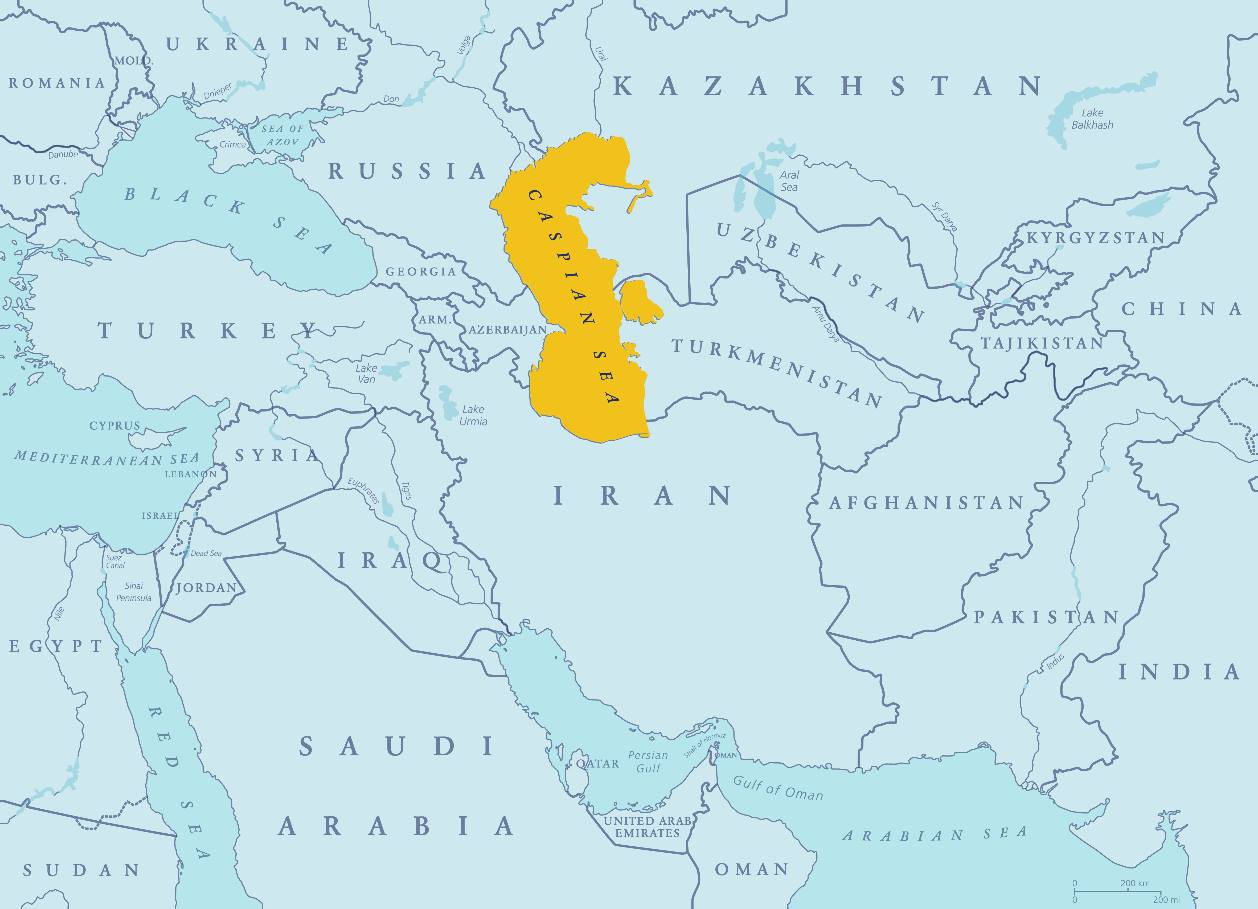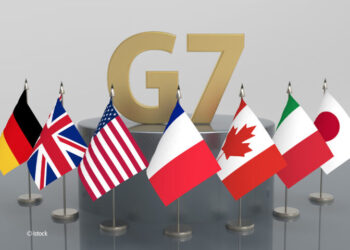Fifth Annual Summit will be held on this sunday (12) in the port city of Aktau, Kazakhstan. information on the summit
Factsheet: Caspian Summit
Overview
- The Caspian Sea is the world’s largest lake. It is approximately the size of Japan, and contains 40% of the world’s lake water.
- It is bordered by Kazakhstan, Russia, Azerbaijan, Iran, and Turkmenistan.
- Over 130 rivers flow into the Caspian Sea, including the Volga and Ural rivers.
- Approximately 850 animal and more than 500 plant species live in the Caspian Sea, including many species that are unique to the region.
The fifth Caspian Summit
- The fifth annual Caspian Summit will take place on 12th August in the Kazakh port city of Aktau.
- Previous meetings were held in 2002 in Ashgabat (Turkmenistan), in 2007 in Tehran (Iran), in 2010 in Baku (Azerbaijan) and in Astrakhan (Russia) in 2014.
- The Summit will be preceded by a special working group meeting, and a meeting of the parties’ Foreign Ministers, on 10th-11th August.
- The meeting will be attended by the leaders of Kazakhstan (President Nursultan Nazarbayev), Azerbaijan (President Ilham Aliyev), Turkmenistan (President Gurbanguly Berdimuhamedow), Iran (Supreme leader Ali Khamenei) and Russia (President Vladimir Putin).
- The countries will discuss the legal status of the Caspian Sea, and the main outcome of the Summit is expected to be signing of the ‘Convention on the Legal Status of the Caspian Sea’.
- The parties will also discuss the development of regional cooperation in the areas of ecology, energy, transport and trade, as well as how to strengthen the security of the Caspian region.
- A series of five-party intergovernmental documents regarding these topics are expected to be signed.
The Sea plays a vital role in the economies of its bordering states
- Oil and gas: The Sea contains some of the largest oil and gas fields in the world.
- Transportation: The location of the Sea makes it a vital transport route for many Eurasian countries, including Kazakhstan.
- Fishing: The Sea is well-known for its unique marine life, with the Caspian accounting for a substantial proportion of global sturgeon supply.
- Tourism: The Sea’s noteworthy sandy beaches serve as recreation resorts.
Current legal status of the Caspian Sea
- Work on the Convention on the Legal Status of the Caspian Sea has been ongoing for more than 20 years, with negotiations on the international legal status of the Caspian Sea regularly taking place since 1996.
- There have been more than 50 meetings of the working group to prepare the Convention on the Legal Status of the Caspian Sea.
- Kazakhstan has already signed several agreements with various members of the Summit to promote cooperation.
Previous Caspian summits
- Ashgabat, Turkmenistan (April 2002): The first summit laid the foundation for holding top-level meetings.
- Tehran, Iran (October 2007): Following the second summit, a joint declaration was signed between the five parties, consolidating the existing agreements on the main issues of the legal status of the Caspian Sea.
- Baku, Azerbaijan (November 2010): During the third summit, two documents were signed between the parties, the first being a cooperation agreement regarding security in the Caspian Sea, and the second being a joint statement by the five Presidents.
- Astrakhan, Russia (September 2014): In the most recent summit before Aktau, the Presidents signed a joint statement establishing a broad list of principles to guide the activities of the coastal states, which were later incorporated into the Convention on the Legal Status of the Caspian Sea. The principles included the peaceful use of the Caspian Sea, security and stability in the region, military activities, the use of bioresources, the protection of the natural environment, and the conduct of marine scientific research in the Caspian Sea.
Quinta Cúpula Cáspia anual será realizada no dia 12 de agosto na cidade portuária de Aktau, no Cazaquistão. seguem informações sobre a cúpula :
Cúpula Cáspia
Visão geral
- O Mar Cáspio é o maior lago do mundo. É aproximadamente do tamanho do Japão e contém 40% da água do lago do mundo.
- Faz fronteira com o Cazaquistão, a Rússia, o Azerbaijão, o Irã e o Turcomenistão.
- Mais de 130 rios correm para o Mar Cáspio, incluindo os rios Volga e Ural.
- Aproximadamente 850 animais e mais de 500 espécies de plantas vivem no Mar Cáspio, incluindo muitas espécies que são exclusivas da região.
A quinta Cúpula Cáspia
- A quinta Cúpula Cáspia anual será realizada no dia 12 de agosto na cidade portuária de Aktau, no Cazaquistão.
- Reuniões anteriores foram realizadas em 2002 em Ashgabat (Turcomenistão), em 2007 em Teerã (Irã), em 2010 em Baku (Azerbaijão) e em Astrakhan (Rússia) em 2014.
- A Cúpula será precedida por uma reunião especial do grupo de trabalho e uma reunião dos Ministros das Relações Exteriores das partes da Cúpula, nos dias 10 a 11 de agosto.
- A reunião contará com a presença dos líderes do Cazaquistão (Presidente Nursultan Nazarbayev), Azerbaijão (Presidente Ilham Aliyev), Turcomenistão (Presidente Gurbanguly Berdimuhamedow), Irã (líder supremo Ali Khamenei) e Rússia (Presidente Vladimir Putin).
- Os países discutirão o status legal do Mar Cáspio, e espera-se que o principal resultado da Cúpula seja a assinatura da “Convenção sobre o Estatuto Jurídico do Mar Cáspio”.
- As partes também discutirão o desenvolvimento da cooperação regional nas áreas de ecologia, energia, transporte e comércio, bem como como fortalecer a segurança da região do Mar Cáspio.
- Espera-se que uma série de documentos intergovernamentais de cinco partes sobre esses tópicos seja assinada.
O mar desempenha um papel vital nas economias de seus estados fronteiricos
- Petróleo e gás: O mar contém alguns dos maiores campos de petróleo e gás do mundo.
- Transporte: A localização do Mar o torna uma rota de transporte vital para muitos países da Eurásia, incluindo o Cazaquistão.
- Pesca: O Mar é bem conhecido por sua vida marinha única, com o Cáspio sendo responsável por uma proporção substancial da oferta mundial de esturjão (peixe).
- Turismo: as notáveis praias de areia do Mar servem como resorts de recreação.
Estatuto legal atual do Mar Cáspio
- O trabalho na Convenção sobre o Estatuto Jurídico do Mar Cáspio está em andamento há mais de 20 anos, com negociações sobre o status legal internacional do Mar Cáspio ocorrendo regularmente desde 1996.
- Foram realizadas mais de 50 reuniões do grupo de trabalho para preparar a Convenção sobre o Estatuto Jurídico do Mar Cáspio.
- O Cazaquistão já assinou vários acordos com vários membros da Cúpula para promover a cooperação.
Cúpulas anteriores do Cáspio
- Ashgabat, Turcomenistão (abril de 2002): A primeira cúpula estabeleceu as bases para a realização de reuniões de alto nível.
- Teerã, Irã (outubro de 2007): Após a segunda cúpula, uma declaração conjunta foi assinada entre as cinco partes, consolidando os acordos existentes sobre as principais questões do status legal do Mar Cáspio.
- Baku, Azerbaijão (Novembro de 2010): Durante a terceira cúpula, foram assinados dois documentos entre as partes, sendo o primeiro um acordo de cooperação em matéria de segurança no Mar Cáspio e o segundo uma declaração conjunta dos cinco presidentes.
- Astracã, Rússia (setembro de 2014): Na mais recente cúpula antes de Aktau, os Presidentes assinaram uma declaração conjunta estabelecendo uma ampla lista de princípios para orientar as atividades dos estados costeiros, que foram posteriormente incorporados à Convenção sobre o Estatuto Jurídico dos Estados. o mar Cáspio. Os princípios incluíam o uso pacífico do Mar Cáspio, segurança e estabilidade na região, atividades militares, o uso de recursos biológicos, a proteção do ambiente natural e a condução da pesquisa científica marinha no Mar Cáspio.






